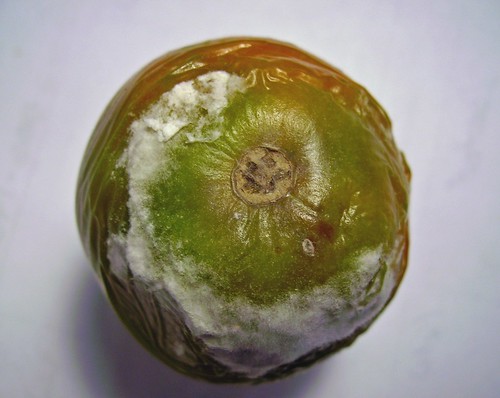 NYTimes | IF the hardship of growing vegetables and fruits in the Northeast has made anything clear, it’s that the list of what can go wrong in the field is a very long one.
NYTimes | IF the hardship of growing vegetables and fruits in the Northeast has made anything clear, it’s that the list of what can go wrong in the field is a very long one.We wait all year for warmer weather and longer days. Once we get them, it seems new problems for farmers rise to the surface every week: overnight temperatures plunging close to freezing, early disease, aphid attacks. Another day, another problem.
The latest trouble is the explosion of late blight, a plant disease that attacks potatoes and tomatoes. Late blight appears innocent enough at first — a few brown spots here, some lesions there — but it spreads fast. Although the fungus isn’t harmful to humans, it has devastating effects on tomatoes and potatoes grown outdoors. Plants that appear relatively healthy one day, with abundant fruit and vibrant stems, can turn toxic within a few days. (See the Irish potato famine, caused by a strain of the fungus.)
Most farmers in the Northeast, accustomed to variable conditions, have come to expect it in some form or another. Like a sunburn or a mosquito bite, you’ll probably be hit by late blight sooner or later, and while there are steps farmers can take to minimize its damage and even avoid it completely, the disease is almost always present, if not active.
But this year is turning out to be different — quite different, according to farmers and plant scientists. For one thing, the disease appeared much earlier than usual. Late blight usually comes, well, late in the growing season, as fungal spores spread from plant to plant. So its early arrival caught just about everyone off guard.
And then there’s the perniciousness of the 2009 blight. The pace of the disease (it covered the Northeast in just a few days) and its strength (topical copper sprays, a convenient organic preventive, have been much less effective than in past years) have shocked even hardened Hudson Valley farmers.
Jack Algiere, head vegetable farmer at the Stone Barns Center for Food and Agriculture (where I have a restaurant that purchases from the farm), lost more than half his field tomatoes in three days. Other organic farmers were forced to make a brutal choice: spray their tomato plants with fungicides, and lose organic certification, or watch the crop disappear. Even for farmers who routinely spray, or who reluctantly spray precautionary amounts, this year’s blight lowered yields. (Fungicides work only to suppress the disease, not cure it.) As one plant pathologist told me, “Farmers are out there praying and spraying.”


0 comments:
Post a Comment